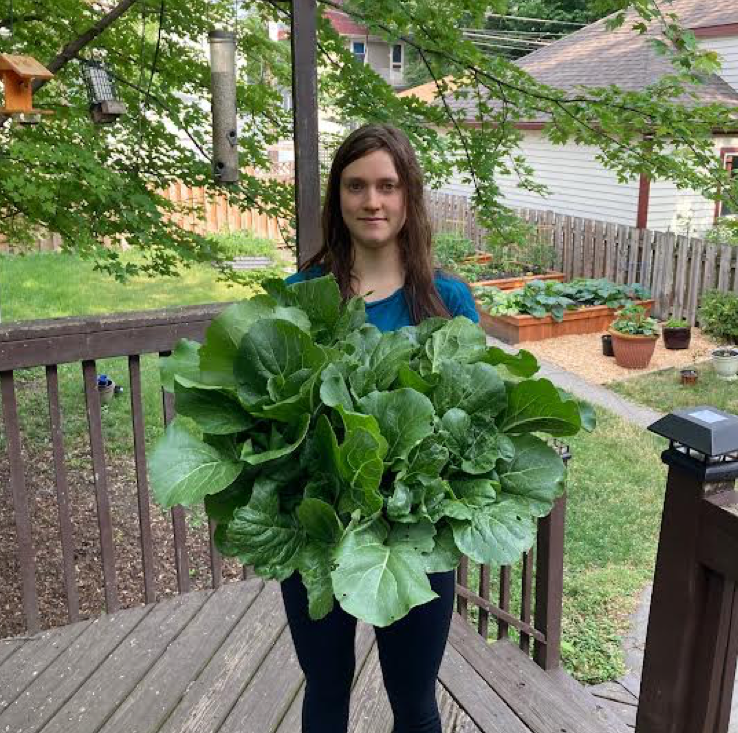Oak Park River Forest High School student Katie Stabb shares her climate story.
Tell a story about an experience that made you aware of climate change/inspired you to be a part of climate activism.
I don’t remember ever not knowing about climate change. I was always pretty environmentally aware, but I began to feel my responsibility more strongly when COVID hit. I suddenly had free time and felt obligated to use it in a positive way. I began to wonder, not ‘why should I work to stop this existential threat’ but ‘why am I NOT doing all I can to stop this existential threat?’ And ‘because I’m busy with my life’ was no longer an answer. Once I got into climate activism, I really took to it. I became even more grounded in my reasons- for the sake of my adult life, my peers, future generations, living things other than humans.

A couple more sparks- that sort of counteract each other: First, on the negative side, Greta Thunberg, who made me feel guilty: for my habits, for not doing more to stop climate change. Then our very own Charlotte Meyer, on the positive side, who made me feel angry: screaming through a bullhorn that oil and gas companies created the carbon footprint to make us feel responsible and deflect the attention from themselves.
I now try to balance these two sides, using personal action to try to be an example for others of how we can build a new set of norms and habits, and to ground myself in larger advocacy work that needs to target industry and government.
What is your experience of climate change?
My experience of climate change is rapidly changing from one of “a terrible thing that is going to happen” to “something that is happening that is going to get worse.” I am lucky to not have experienced the worst level of effects yet, partially because Oak Park is generally pretty privileged, but fires, storms, and heatwaves are beginning to touch Oak Park too.
What was a time you had to be resilient in climate change work?
I had to be resilient when I was a part of Sunrise and we were trying to plan an event. Our hub leaders were not responding, and I (along with Manolo) stepped in to coordinate the event myself. This was difficult because I didn’t have experience, and didn’t want to make any decisions that our hub leaders would disagree with. But I was adamant that the event would happen, and it did.
What does a better world look like to you?
A better world looks like sustainable energy that powers public transportation, industry, and our private lives. Our cities and homes are built with the changing climate in mind. This new infrastructure and power grid has all been built by citizens with good paying green union jobs. When new renewable energy projects are established, environmental justice concerns are taken into account and community inputs are considered. Farms grow multiple crops that are naturally more resistant to the changing climate, and plant-based food is prevalent, inexpensive, and celebrated.
I am not sure what role I will play in this transition but right now I am considering battery technology. To store solar and wind and other renewable energy, we need efficient, clean, batteries that ideally don’t require precious metals or ores that come from terrible mines.
However, sustainable food systems and environmental policy to make all of this even possible are also interesting to me.
How does going to COP play a role in your climate activism journey?
COP will be formative for me to see the process of how environmental policy is made. I am curious to see how or to what extent scientific reports and demands from the public actually translate into policy. Also, I may be interested in studying environmental science or policy in the future, so COP is a way to help me explore new ideas in these domains and potentially help me figure out a path of study. Finally, it will allow me to connect with other similarly passionate individuals and learn about their stories and experiences.
What do you hope to gain from attending COP?
Going to COP28 will help me get a better idea of how climate policy works on the international level. It will also help me determine what I want to pursue in the future, and introduce me to people and organizations whose work I may want to support.
What do you want world leaders to know?
I want world leaders to know that we as young people see and are directly harmed by their inaction. We are not ignorant, and we will continue to put pressure on them until we get the results we need. Climate change is too important to take no for an answer.
What do you want adults and decision makers in your community to know? How about your peers?
I want adults and decision makers to know that we really care about this, and at least some of us think about it a lot. I want politicians to know that we have the power to put public pressure on them or eventually vote them out if they do not treat this crisis with the urgency it deserves. I want my peers to also know that we have this power, but we have to harness it! It’s not too late, and every person and every fraction of a degree matters. I really want to cut through the apathy here.
